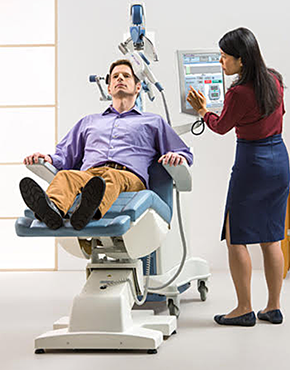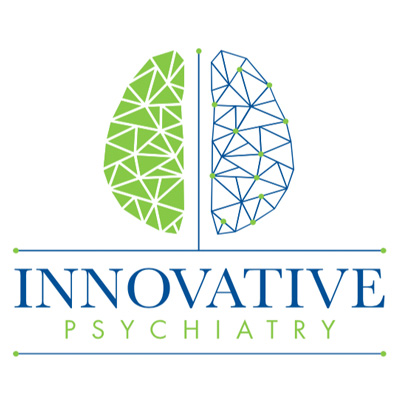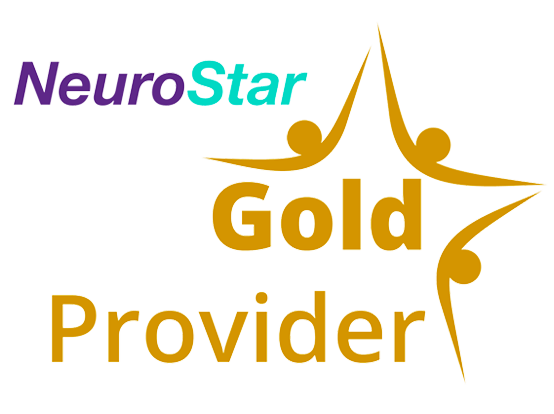NeuroStar TMS Therapy
WHY CHOOSE TMS?

Transcranial magnetic stimulation (TMS) is a lasting treatment for depression that uses non-invasive magnetic pulses to stimulate the mood center of the brain. This creates an electric current that has consistently been shown to help patients with treatment-resistant depression who have not found relief from their symptoms with other therapies, such as antidepressant medications or psychotherapy.
TMS has been FDA-cleared since 2008, and numerous clinical studies have found this state-of-the-art treatment to be:
Effective: The majority of patients experience relief within several weeks.
Lasting: Patients improve during treatment and continue to feel better after treatment is complete.
Non-Invasive: TMS is an outpatient treatment that uses magnets the strength of an MRI placed on the head.
Insurance accepted: Cigna, Carefirst BlueCross & BlueShield and Johns Hopkins Health Care EHP & USFHP
* All other insurances have the potential for a single case agreement, please contact our office for more information
What is NeuroStar Advanced Therapy (TMS)?
During a NeuroStar treatment session, a magnet similar in strength to that used in a magnetic resonance imaging (MRI) machine is used to stimulate nerve cells in the area of the brain thought to control mood. These magnetic pulses may have a positive effect on the brain’s neurotransmitter levels, mak ing long-term remission possible.

With more than one million treatments performed, this novel treatment approach to achieving remission is bringing new hope to people every day.
How NeuroStar TMS Therapy Works
How does NeuroStar work?
NeuroStar is a non-drug and non-invasive treatment for depression, anxiety symptoms associated with depression and OCD delivered in a doctor’s office. You recline comfortably in a NeuroStar chair (much like a dentist’s chair or spa chair) during treatment. During a treatment session, precisely targeted magnetic pulses stimulate the mood-regulating areas in the brain. There is no anesthesia or sedation. You are fully awake and alert during treatment, and you can resume normal activities immediately after a treatment session.
Does it hurt?
During the session, you will feel a tapping sensation on your head. Each treatment session lasts around 19 minutes. Some NeuroStar patients experience mild to moderate pain or discomfort at or near the treatment site during the first week of treatment.
How can I pay for it?
NeuroStar TMS Therapy for depression is covered by most insurance plans, including Tricare, after medication options have proven ineffective in your major depression treatment. Contact us to learn more about your insurance coverage. We also offer CareCredit for financing.
PATIENT PROCESS:

NO COST CONSULTATION:
Meeting with a patient consultant to learn about the TMS therapy treatment process and begin the insurance paperwork.EVALUATION:
Meeting with Dr. Mattai to further investigate whether TMS is right for you.FIRST APPOINTMENT:
Dr. Mattai will identify the precise areas of your brain that control depression, and establish your unique treatment settings on the TMS device *NeuroStar TMS Testimonials
FREQUENTLY ASKED QUESTIONS
How is TMS different from other treatments?
TMS is very different from medications and talk therapy. Medications aren't as customizable - they may not work for genetic reasons and could cause moderate to severe side effects. Symptoms of depression can interfere with the comfort and effectiveness of talk therapy. TMS is targeted to the part of the brain that regulates mood, treating depression as its neurological source.Does TMS affect my whole body, or just my brain?
The magnetic position and magnetic dose used in TMS therapy is customized to you during your first appointment. Side effects are oftentimes limited to the treatment site, such as headaches or toothaches, rather than the entire body.Is TMS the same as ECT?
No, ECT induces a seizure and requires a hospital setting, anesthesia, and extended recovery time. ECT is associated with side effects like memory loss, mood changes, and nausea. TMS is a treatment applied directly to the specific area of your brain that regulates mood, requires no hospitalization, anesthesia, or downtime, and has minimal side effects like scalp discomfort, headaches or toothaches.What is "Off label" TMS?
The FDA has only cleared TMS Therapy for Major Depression, despite overwhelming scientific evidence that TMS Therapy is being successfully used to treat a wide range of other mental health disorders and illnesses globally. When TMS therapy is administered for treatment of other mental disorders, not currently cleared by the FDA it is described as “off label”.
Those illnesses include:
- ADD/ADHD
- Chronic Pain
- Bipolar Disorder
- Anxiety Disorders
- Eating Disorders
- PTSD
- Obsessive Compulsive Disorder (OCD)
- Substance Abuse
- Panic Disorder
- And others, inquire within!
Are“Off Label” TMS therapy solutions covered by insurance?
No. For this reason, Dr. Mattai has searched the globe for TMS devices and protocols that would allow him to lower his treatment costs while providing best practice services. He discovered FDA cleared TMS devices from Denmark and Israel with Theta Burst coils and protocols that dramatically lower TMS treatment time and cost.



